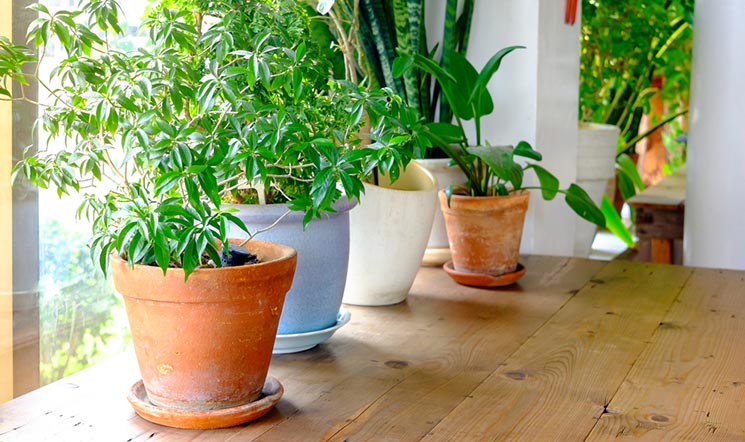Detoxify Your Home
The average home is riddled with airborne pollutants, ranging from mold and bacteria to volatile organic compounds (VOCs) and pollen. The buildup of these pollutants can pose a serious threat to your health; the Environmental Protection Agency (EPA) even ranked indoor air pollution among the top five environmental risks to the public. Thankfully, there are ways to detoxify and improve your home’s air quality.
Beware of Air Fresheners and Scented Candles
Yes, they smell nice, but many air fresheners and scented candles contain toxic chemicals that further pollute your home. A 2009 study conducted by researchers at South Carolina State University found that paraffin scented candles — the most common type of candle — produced toxic chemicals like toluene when burned. Other studies have found harsh chemicals like phthalates in commonly used air fresheners.

Decorate with Houseplants
Houseplants brighten up any room. Aside from the aesthetic value, houseplants also filter toxins and impurities from the air. They capture airborne pollutants that would otherwise end up circulating throughout your home, while producing fresh oxygen in the process.

NASA conducted a study in the late 1980s to determine which plants were most effective at cleaning the air in their space stations. According to the study’s researchers, some of the top air-purifying plants include the following:
- Dwarf date palm
- Areca palm
- Boston fern
- English ivy
- Lilyturf
- Spider plant
- Devil’s ivy
- Bamboo palm
- Cornstalk dracaena
- Weeping fig
- Dumb canes
- Aloe vera
Vacuum the Carpet
Many homeowners prefer carpet over laminate, hardwood and similar flooring options. Sure, it’s cozy under the toes, but it needs routine attention. When was the last time you vacuumed the carpet thoroughly? Dust, pollen, dirt and other airborne pollutants settle inside the fibers where they remain trapped. According to the EPA, poorly maintained carpet will release “significant quantities” of particles such as these into the air.
Change the Air Filter
HVAC filters are designed specifically for filtering particulate matter from the air. As air circulates in your home, it travels through the filter where dust and other airborne pollutants are captured. Failure to change your air filter regularly reduces its effectiveness and contributes to greater indoor air pollution.
How often should you change the air filter?
- Once every 30-60 days during summer, spring and fall
- Once every 60-90 days during winter
Maintain 40-50 Percent Humidity
You can also promote clean air inside your home by maintaining a relative humidity of 40 to 50 percent. High humidity encourages mold growth and dust mites, whereas excessively low humidity allows pollutants to circulate through the air more easily. Use either a humidifier or dehumidifier to control the humidity level in your home.
Open your Windows!
We couldn’t possibly complete this post without adding the most obvious solution to the list. With all the dust, pet dander, and other toxins polluting the air inside your home, it’s really important to let the fresh air in every once in a while! When the weather is accommodating, just open a few windows.
And of course, if your windows are sticky, fogged up, or just plain inoperable, give us a call! We can repair or replace your windows and doors so you can much more easily detoxify your home and let the fresh air in all year round.



